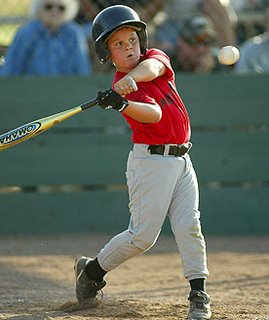 With the Little League World Series ongoing, the legislature's Joint Committee on Public Health is taking the opportunity to share the spotlight by holding hearings on safety in youth baseball. Among the solutions they are investigating are a ban on metal bats.
With the Little League World Series ongoing, the legislature's Joint Committee on Public Health is taking the opportunity to share the spotlight by holding hearings on safety in youth baseball. Among the solutions they are investigating are a ban on metal bats.Local youth baseball organizations from Little League to the MIAA should take the initiative and voluntarily switch to all wooden bats. The state house should stay out of it.
When aluminum bats were originally developed and marketed to baseball teams, they were popular because they were a little cheaper in the long run than wooden bats since they were less apt to break. Over time, technology advanced to the point where aluminum bats also produce much more power. Aluminum bats today are much more expensive--and dangerous--than 20 or 30 years ago.
Since there is no longer an economic reason to continue using metal bats (the best ones can cost up to $200 or more), all leagues below the college level should voluntarily hang up the aluminum sticks. Would it cause a competitive disadvantage for those teams that advance out of the state to the Little League (or Cal Ripken or Babe Ruth) World Series? Probably. But the leagues should be looking out for all of their players, not just those 12 good enough to advance to a national tournament.
And they should do it voluntarily and quickly, so the legislature doesn't get involved. Like so many things government tries to solve, they would end up screwing it up. For instance, the House committee chairman suggested that they would look at other safety measures as well, including changing the distance from the mound to home plate. If Little League coaches and administrators are worried about what will happen if they ban metal bats, being the only state in the country without a 46-foot pitching distance would cause more problems than any change to the composition of the bat.
Tags: Massachusetts Aluminum Wood Baseball Bat Little League


